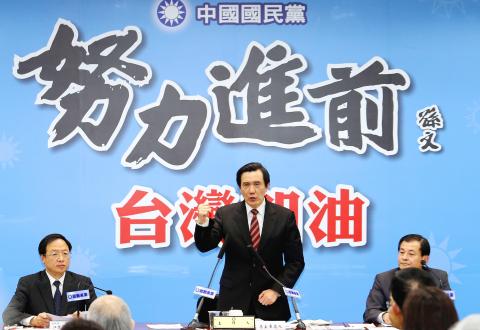One day after Legislative Speaker Wang Jin-pyng (王金平) delivered a pledge that could substantially delay the review of the cross-strait service trade agreement by the legislature, President Ma Ying-jeou (馬英九) met with Chinese Nationalist Party (KMT) lawmakers last night to devise a response.
Wang on Sunday promised the Sunflower movement students occupying the legislative chamber he would not convene any inter-party negotiations on the pact before the legislature enacts a law to monitor cross-strait negotiations and agreements, which many believe would effectively freeze the pact, the status of which has been disputed among lawmakers during the legislative process.
Wang’s offer was welcomed by the students, who have demanded that a mechanism to monitor cross-strait talks be established before a review of the pact begins, but the Presidential Office and the Executive Yuan both said that they had been taken surprise by Wang’s statement.

Photo: CNA
Some KMT lawmakers said they felt “betrayed” by Wang.
KMT lawmakers were ordered to attend the caucus meeting at 6pm yesterday at the party’s headquarters presided over by Ma, who is also KMT chairman, and attended by Premier Jiang Yi-huah (江宜樺) or face party discipline.
Earlier yesterday, some KMT lawmakers voiced their support for Wang.
Those who cannot come up with better ways to resolve the situation than the one Wang offered should “shut up,” KMT Legislator Huang Chao-shun (黃昭順).
KMT Legislator Lai Shyh-bao (賴士葆) suggested that a referendum be called to decide the fate of the pact because it would be naive to think that the agreement would be ratified by the legislature after the Sunflower movement.
Late last night, after the students announced that they would leave the legislative chamber at 6pm on Thursday, Ma issued a statement commending the students’ decision.
Returning the legislature to normal operation so lawmakers can review bills concerning people’s livelihoods met the public’s expectations, Ma said.
Ma said that Wang’s pledge did not conflict with the government’s position that the agreement should be reviewed article-by-article in the legislature.
However, Ma and Jiang both reiterated that the legislature should continue its review of the service trade agreement while it deliberates the proposed legislation on establishing a monitoring mechanism for cross-strait negotiations.
If an oversight bill has to be enacted before the cross-strait service trade agreement can be reviewed, “we can only expect to see the economy decline” from now until 2016 because it could take as long as two years to pass the bill, Jiang said.
The delay in ratifying the service trade agreement could negatively affect cross-strait negotiations on trade in goods and hinder the nation’s bid to join the negotiations on the Trans-Pacific Partnership and to join the Regional Comprehensive Economic Partnership, Jiang said.
Ma called on KMT lawmakers to enact an oversight bill before the legislative session ends in the middle of the year.
He also urged opposition lawmakers not to boycott the service trade pact, saying that otherwise, they would not meet the public’s expectations.

ENDEAVOR MANTA: The ship is programmed to automatically return to its designated home port and would self-destruct if seized by another party The Endeavor Manta, Taiwan’s first military-specification uncrewed surface vehicle (USV) tailor-made to operate in the Taiwan Strait in a bid to bolster the nation’s asymmetric combat capabilities made its first appearance at Kaohsiung’s Singda Harbor yesterday. Taking inspiration from Ukraine’s navy, which is using USVs to force Russia’s Black Sea fleet to take shelter within its own ports, CSBC Taiwan (台灣國際造船) established a research and development unit on USVs last year, CSBC chairman Huang Cheng-hung (黃正弘) said. With the exception of the satellite guidance system and the outboard motors — which were purchased from foreign companies that were not affiliated with Chinese-funded

PERMIT REVOKED: The influencer at a news conference said the National Immigration Agency was infringing on human rights and persecuting Chinese spouses Chinese influencer “Yaya in Taiwan” (亞亞在台灣) yesterday evening voluntarily left Taiwan, despite saying yesterday morning that she had “no intention” of leaving after her residence permit was revoked over her comments on Taiwan being “unified” with China by military force. The Ministry of the Interior yesterday had said that it could forcibly deport the influencer at midnight, but was considering taking a more flexible approach and beginning procedures this morning. The influencer, whose given name is Liu Zhenya (劉振亞), departed on a 8:45pm flight from Taipei International Airport (Songshan airport) to Fuzhou, China. Liu held a news conference at the airport at 7pm,

Taiwan was ranked the fourth-safest country in the world with a score of 82.9, trailing only Andorra, the United Arab Emirates and Qatar in Numbeo’s Safety Index by Country report. Taiwan’s score improved by 0.1 points compared with last year’s mid-year report, which had Taiwan fourth with a score of 82.8. However, both scores were lower than in last year’s first review, when Taiwan scored 83.3, and are a long way from when Taiwan was named the second-safest country in the world in 2021, scoring 84.8. Taiwan ranked higher than Singapore in ninth with a score of 77.4 and Japan in 10th with

GRIDLOCK: The National Fire Agency’s Special Search and Rescue team is on standby to travel to the countries to help out with the rescue effort A powerful earthquake rocked Myanmar and neighboring Thailand yesterday, killing at least three people in Bangkok and burying dozens when a high-rise building under construction collapsed. Footage shared on social media from Myanmar’s second-largest city showed widespread destruction, raising fears that many were trapped under the rubble or killed. The magnitude 7.7 earthquake, with an epicenter near Mandalay in Myanmar, struck at midday and was followed by a strong magnitude 6.4 aftershock. The extent of death, injury and destruction — especially in Myanmar, which is embroiled in a civil war and where information is tightly controlled at the best of times —